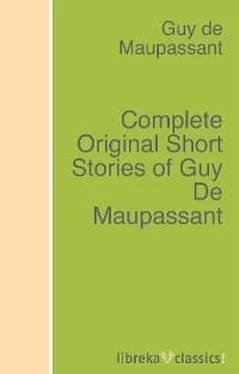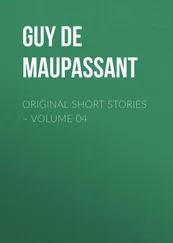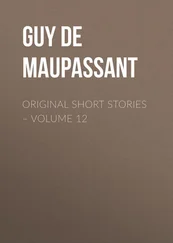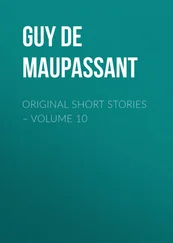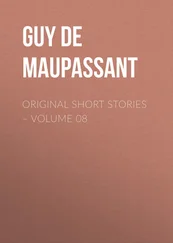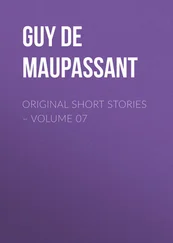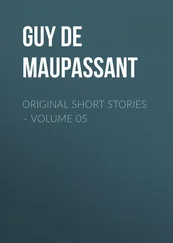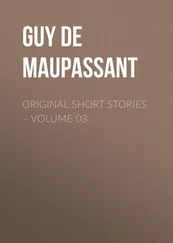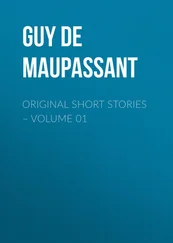Guy Maupassant - Complete Original Short Stories of Guy De Maupassant
Здесь есть возможность читать онлайн «Guy Maupassant - Complete Original Short Stories of Guy De Maupassant» — ознакомительный отрывок электронной книги совершенно бесплатно, а после прочтения отрывка купить полную версию. В некоторых случаях можно слушать аудио, скачать через торрент в формате fb2 и присутствует краткое содержание. Жанр: unrecognised, на английском языке. Описание произведения, (предисловие) а так же отзывы посетителей доступны на портале библиотеки ЛибКат.
- Название:Complete Original Short Stories of Guy De Maupassant
- Автор:
- Жанр:
- Год:неизвестен
- ISBN:нет данных
- Рейтинг книги:4 / 5. Голосов: 1
-
Избранное:Добавить в избранное
- Отзывы:
-
Ваша оценка:
- 80
- 1
- 2
- 3
- 4
- 5
Complete Original Short Stories of Guy De Maupassant: краткое содержание, описание и аннотация
Предлагаем к чтению аннотацию, описание, краткое содержание или предисловие (зависит от того, что написал сам автор книги «Complete Original Short Stories of Guy De Maupassant»). Если вы не нашли необходимую информацию о книге — напишите в комментариях, мы постараемся отыскать её.
Immerse yourself in well-known and popular titles!
Complete Original Short Stories of Guy De Maupassant — читать онлайн ознакомительный отрывок
Ниже представлен текст книги, разбитый по страницам. Система сохранения места последней прочитанной страницы, позволяет с удобством читать онлайн бесплатно книгу «Complete Original Short Stories of Guy De Maupassant», без необходимости каждый раз заново искать на чём Вы остановились. Поставьте закладку, и сможете в любой момент перейти на страницу, на которой закончили чтение.
Интервал:
Закладка:
But there was something in the air, a something strange and subtle, an intolerable foreign atmosphere like a penetrating odor—the odor of invasion. It permeated dwellings and places of public resort, changed the taste of food, made one imagine one's self in far-distant lands, amid dangerous, barbaric tribes.
The conquerors exacted money, much money. The inhabitants paid what was asked; they were rich. But, the wealthier a Norman tradesman becomes, the more he suffers at having to part with anything that belongs to him, at having to see any portion of his substance pass into the hands of another.
Nevertheless, within six or seven miles of the town, along the course of the river as it flows onward to Croisset, Dieppedalle and Biessart, boat-men and fishermen often hauled to the surface of the water the body of a German, bloated in his uniform, killed by a blow from knife or club, his head crushed by a stone, or perchance pushed from some bridge into the stream below. The mud of the river-bed swallowed up these obscure acts of vengeance—savage, yet legitimate; these unrecorded deeds of bravery; these silent attacks fraught with greater danger than battles fought in broad day, and surrounded, moreover, with no halo of romance. For hatred of the foreigner ever arms a few intrepid souls, ready to die for an idea.
At last, as the invaders, though subjecting the town to the strictest discipline, had not committed any of the deeds of horror with which they had been credited while on their triumphal march, the people grew bolder, and the necessities of business again animated the breasts of the local merchants. Some of these had important commercial interests at Havre —occupied at present by the French army—and wished to attempt to reach that port by overland route to Dieppe, taking the boat from there.
Through the influence of the German officers whose acquaintance they had made, they obtained a permit to leave town from the general in command.
A large four-horse coach having, therefore, been engaged for the journey, and ten passengers having given in their names to the proprietor, they decided to start on a certain Tuesday morning before daybreak, to avoid attracting a crowd.
The ground had been frozen hard for some time-past, and about three o'clock on Monday afternoon—large black clouds from the north shed their burden of snow uninterruptedly all through that evening and night.
At half-past four in the morning the travellers met in the courtyard of the Hotel de Normandie, where they were to take their seats in the coach.
They were still half asleep, and shivering with cold under their wraps. They could see one another but indistinctly in the darkness, and the mountain of heavy winter wraps in which each was swathed made them look like a gathering of obese priests in their long cassocks. But two men recognized each other, a third accosted them, and the three began to talk. "I am bringing my wife," said one. "So am I." "And I, too." The first speaker added: "We shall not return to Rouen, and if the Prussians approach Havre we will cross to England." All three, it turned out, had made the same plans, being of similar disposition and temperament.
Still the horses were not harnessed. A small lantern carried by a stable-boy emerged now and then from one dark doorway to disappear immediately in another. The stamping of horses' hoofs, deadened by the dung and straw of the stable, was heard from time to time, and from inside the building issued a man's voice, talking to the animals and swearing at them. A faint tinkle of bells showed that the harness was being got ready; this tinkle soon developed into a continuous jingling, louder or softer according to the movements of the horse, sometimes stopping altogether, then breaking out in a sudden peal accompanied by a pawing of the ground by an iron-shod hoof.
The door suddenly closed. All noise ceased.
The frozen townsmen were silent; they remained motionless, stiff with cold.
A thick curtain of glistening white flakes fell ceaselessly to the ground; it obliterated all outlines, enveloped all objects in an icy mantle of foam; nothing was to be heard throughout the length and breadth of the silent, winter-bound city save the vague, nameless rustle of falling snow—a sensation rather than a sound—the gentle mingling of light atoms which seemed to fill all space, to cover the whole world.
The man reappeared with his lantern, leading by a rope a melancholy-looking horse, evidently being led out against his inclination. The hostler placed him beside the pole, fastened the traces, and spent some time in walking round him to make sure that the harness was all right; for he could use only one hand, the other being engaged in holding the lantern. As he was about to fetch the second horse he noticed the motionless group of travellers, already white with snow, and said to them: "Why don't you get inside the coach? You'd be under shelter, at least."
This did not seem to have occurred to them, and they at once took his advice. The three men seated their wives at the far end of the coach, then got in themselves; lastly the other vague, snow-shrouded forms clambered to the remaining places without a word.
The floor was covered with straw, into which the feet sank. The ladies at the far end, having brought with them little copper foot-warmers heated by means of a kind of chemical fuel, proceeded to light these, and spent some time in expatiating in low tones on their advantages, saying over and over again things which they had all known for a long time.
At last, six horses instead of four having been harnessed to the diligence, on account of the heavy roads, a voice outside asked: "Is every one there?" To which a voice from the interior replied: "Yes," and they set out.
The vehicle moved slowly, slowly, at a snail's pace; the wheels sank into the snow; the entire body of the coach creaked and groaned; the horses slipped, puffed, steamed, and the coachman's long whip cracked incessantly, flying hither and thither, coiling up, then flinging out its length like a slender serpent, as it lashed some rounded flank, which instantly grew tense as it strained in further effort.
But the day grew apace. Those light flakes which one traveller, a native of Rouen, had compared to a rain of cotton fell no longer. A murky light filtered through dark, heavy clouds, which made the country more dazzlingly white by contrast, a whiteness broken sometimes by a row of tall trees spangled with hoarfrost, or by a cottage roof hooded in snow.
Within the coach the passengers eyed one another curiously in the dim light of dawn.
Right at the back, in the best seats of all, Monsieur and Madame Loiseau, wholesale wine merchants of the Rue Grand-Pont, slumbered opposite each other. Formerly clerk to a merchant who had failed in business, Loiseau had bought his master's interest, and made a fortune for himself. He sold very bad wine at a very low price to the retail-dealers in the country, and had the reputation, among his friends and acquaintances, of being a shrewd rascal a true Norman, full of quips and wiles. So well established was his character as a cheat that, in the mouths of the citizens of Rouen, the very name of Loiseau became a byword for sharp practice.
Above and beyond this, Loiseau was noted for his practical jokes of every description—his tricks, good or ill-natured; and no one could mention his name without adding at once: "He's an extraordinary man—Loiseau." He was undersized and potbellied, had a florid face with grayish whiskers.
His wife-tall, strong, determined, with a loud voice and decided manner —represented the spirit of order and arithmetic in the business house which Loiseau enlivened by his jovial activity.
Beside them, dignified in bearing, belonging to a superior caste, sat Monsieur Carre-Lamadon, a man of considerable importance, a king in the cotton trade, proprietor of three spinning-mills, officer of the Legion of Honor, and member of the General Council. During the whole time the Empire was in the ascendancy he remained the chief of the well-disposed Opposition, merely in order to command a higher value for his devotion when he should rally to the cause which he meanwhile opposed with "courteous weapons," to use his own expression.
Читать дальшеИнтервал:
Закладка:
Похожие книги на «Complete Original Short Stories of Guy De Maupassant»
Представляем Вашему вниманию похожие книги на «Complete Original Short Stories of Guy De Maupassant» списком для выбора. Мы отобрали схожую по названию и смыслу литературу в надежде предоставить читателям больше вариантов отыскать новые, интересные, ещё непрочитанные произведения.
Обсуждение, отзывы о книге «Complete Original Short Stories of Guy De Maupassant» и просто собственные мнения читателей. Оставьте ваши комментарии, напишите, что Вы думаете о произведении, его смысле или главных героях. Укажите что конкретно понравилось, а что нет, и почему Вы так считаете.
